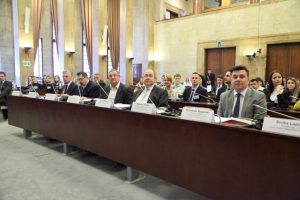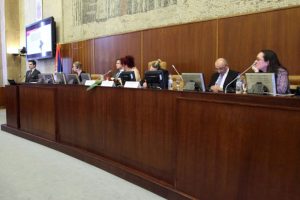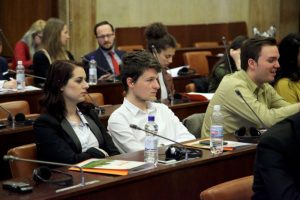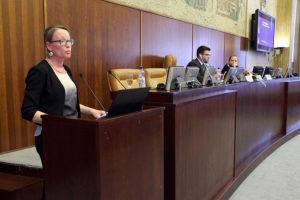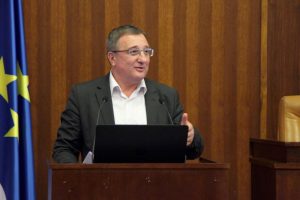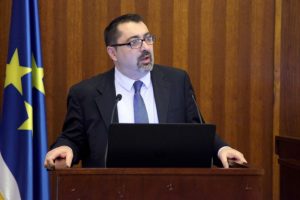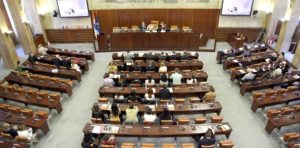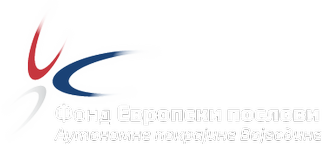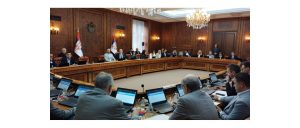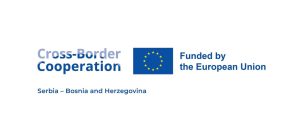Committee of the Regions Institutional Student Simulation at the Assembly of the Autonomous Province of Vojvodina
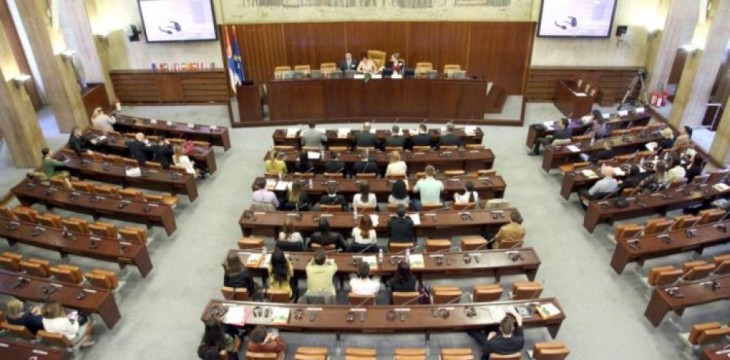
The Committee of the Regions Institutional Student Simulation, organized by the students of different faculties of University of Novi Sad and Belgrade, gathered at the BEUM student organization, has been opened today at the Assembly of the Autonomous Province of Vojvodina, as a part of the “CoRIUSS Vojvodina“ project, being supported by the Assembly of the Autonomous Province of Vojvodina, Provincial Government, University of Novi Sad, “Európa Kollégium“ student dorm, European Affairs Fund of AP Vojvodina and national councils of national minorities in Serbia.
Ana Tomanova Makanova, Vice-President of AP Vojvodina, opened the conference and thanked everyone who supported the first institutional student simulation in Novi Sad, emphasizing that it was a rational decision to support young people in the idea from which everybody could benefit. The simulation was a novelty and its goal was to help and open the door for young people, i.e. decision-makers and future policy creators to be. The Vice-President of the Assembly of AP Vojvodina said that that young people needed to be helped in their future ambitions, and the Assembly of AP Vojvodina, as the home of all national communities and majority people, was the right place for that. During the three-day event, they would learn how to be initiators of events, how to be tolerant and team players and how to build together a better future.
István Pásztor, President of the Assembly of AP Vojvodina, said that it was a great responsibility to great the future leaders who would be holders of new European cooperation policies and that he was convinced that the Assembly, as the highest body fulfilling the normative functions of AP Vojvodina, was the right place to learn the alphabet of politics. The President of the Assembly of AP Vojvodina added that, for him, the simulation was like any other learning process involving a series of lectures, learning those lectures, and finally, the practical application of learned lessons. In his view, the three most important lessons the students should pay attention to were the following: awareness of the power of the publicly spoken word, nurturing awareness of the common historical, cultural, economic relations, as well as the common European history bonding us all. According to Pásztor, politics was an area of joint work aimed at all citizens’ well-being. However, joint efforts on the common well-being meant that we should pay attention to the significance of publicly spoken word all the time; nurture the awareness of common historical, cultural, economic relationship of all European regions, and never forget that good political community existed only if everyone saw a perspective.
Annamaria Makanova, Coordinator of the CoRIUSS Vojvodina project, presented the topics to be discussed during the simulation: international economic cooperation as a solution for youth unemployment and the significance of social cohesion in multicultural, multi-ethnic and multilingual regions.
Đorđe Đorđević, Programme Director of BEUM, said that the selected participants would have the opportunity to take on the role of mayors, county and regional presidents, advisers and other regional representatives, and in that way learn about the Committee of the Regions (CoR) itself, as well as other regions presented at the CoR.
After that the members of the Provincial Government and rector of the University of Novi Sad, Dušan Nikolić addressed the young people with the aim of presenting them Vojvodina as a multicultural, multi-ethnic and multilingual region, from the perspective of their scope of work.
After his presentation “National minorities in Vojvodina“, Mihály Nyilas, Vice President of the Provincial Government and Provincial Secretariat for Education, Regulations, Administration and National Minorities – National Communities, assessed that the relations among the national communities in Vojvodina were traditionally good, that the number of incidents based on ethnicity was low and that they were individual cases. According to him, the Provincial Government and the competent secretariats had done a lot in that respect through different projects and general operation of the provincial administration, and expressed his hope that those projects would continue. Nyilas also referred to the Action Plan for National Minorities under Chapter 23, which in his opinion, was a condition for opening the negotiation chapter. Its goal was to maintain the level of acquired rights and promote those rights and liberties. According to him, the Action Plan was the guarantee for the national minorities to exercise their rights until full EU membership because its implementation was to be monitored each year. Nyilas pointed out that the members of national minorities needed to be aware that those rights would exist as long as they were used.
Branislav Bugarski, Provincial Secretary for Interregional Cooperation and Local Self-Government, told the students to be brave and not to be cowards. In his view, young people needed to pose questions about the reasons why today’s society was as it was and fight for it to be better. Bugarski said to the young people that they should not look for the differences between them and their neighbours, but try to find common connection points and they would realize that there were more points connecting them than those separating them. Secretary Bugarski said that the CoR was a part of the pillar of the European future where regions and local self-governments discussed issues important to them, as well as about how to make a better European future, taking into account that there was a link between the decisions made at a high level. Bugarski said that our society, our context in which we lived and all the challenges that we faced could be resolved only through dialogue, so as to build a better society. He added that we were all Europeans and that Europe had two main supporting pillars: peace and socio-economic prosperity, and we should aim at them. In his opinion, young people needed to be involved in social processes because at some future point, they would have to take on responsibility, fight to be the best, seek to improve their position and build a better future for themselves and their beloved ones. Secretary Bugarski concluded that there would be no new jobs if Europe was not able to maintain its competitiveness on the world market, which could be achieved only by investing in research, development and infrastructure of the 21st century.
Vladimir Pavlov, Provincial Secretary for Science and Technological Development said to the young people that they belonged to the generation that could choose not to make the mistakes of the previous generations, that they belonged to Europe, that they could decide how we would enter Europe, and because of that they were our first chance. Secretary Pavlov added that young people born after the 90s had immeasurable advantage over the previous generations because during their growth and education, they were able to travel all over Europe and increase their knowledge; new technologies were available to them and access to information was faster. Furthermore, Pavlov said that investment in science was the only integral solution to the problems, not only in Serbia, but all over Europe. He added that the relevant provincial secretariat supported the development of science and technology in Vojvodina by means of a number of measures, with special focus on projects promoting international cooperation. The fact that Vojvodina allocated around 3.6 million euros for international projects in the past and attracted 36 million euros in scientific research spoke about the profitability of investing in international projects. Pavlov added that it was the right way and it was proven by the fact that about 1000 young scientists and researchers having been engaged in international projects supported by the Provincial Secretariat for Science remained in the country, because a system in which knowledge was valued was developed.
At the panel discussion “Increasing the participation of young people in decision-making: the role of local and regional bodies and inter-regional cooperation“, the speakers were the following: Mariëlle van Miltenburg, Deputy Head of Mission, Dutch Embassy, who spoke about young people in the context of the Netherlands presidency of the Council of the EU; Siniša Lazić, Director of the European Affairs Fund AP Vojvodina, who spoke about young people in the European integration; prof. Dragana Ćorić, Professor at the Faculty of Law, University of Novi Sad; and Emil Lulić, Legal advisor to the President of the National Council of the Hungarian Ethnic Minority.
The three-day simulation, being held at the Assembly of AP Vojvodina and Rectorate of the University of Novi Sad, from 1st to 3rd April 2016, has gathered about 80 students from Hungary, Slovakia, Romania, the Czech Republic, Albania, Croatia, Slovenia, Montenegro, Bosnia and Herzegovina, Macedonia, Bulgaria, Italy and Serbia.
